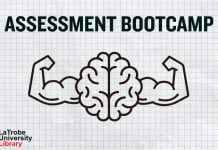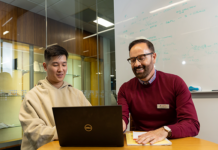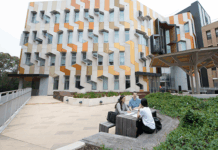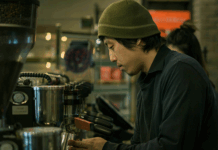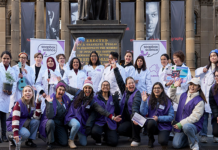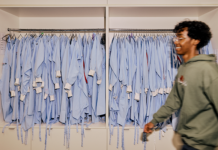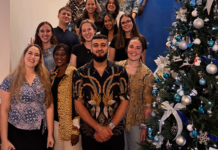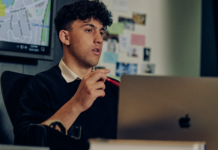When Rebekah Quinn lodged her University course preferences in Year 12, she had little idea where she was headed. She made a last-minute decision to include a Health Information Management course at La Trobe’s Bundoora Campus in her preferences – a course she’d never really heard of.
This split second decision would change her life and take her around the world, where she’d establish a thrilling global career. Six years after graduating, Rebekah would return home to a challenging career working with some of Australia’s best hospitals.
Growing up on the Murray
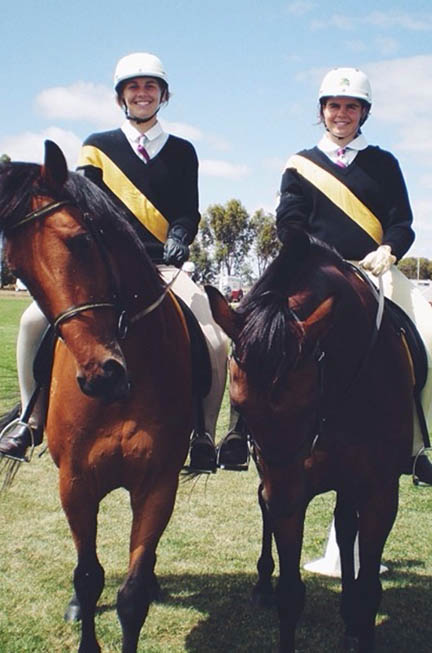
On the family farm in Cohuna, Northern Victoria, Rebekah grew up riding horses along the Murray River and helping out her parents and siblings in the dairy. Four of the biggest factors that would come to influence her career began there in her small home-town: family, networking, an interest in health and a passion for travel.
Despite living hours from her future-home, Melbourne, Rebekah never felt isolated. She was an active sportsperson, playing netball, tennis, basketball and volleyball, as well as horse riding in shows on the weekends. Both sport and school enabled Rebekah to mingle with her tight-knit community and those in neighboring towns.
“I really embraced knowing and meeting people from other towns through sport and school activities,” says Rebekah, whose networking skills would ultimately drive her career success.
The Quinn family were also devout Macorna Football Netball Club supporters, with their four kids taking the field and court each week. Rebekah volunteered as the senior football trainer, receiving a certificate in the treatment of sports injuries.
“I played netball my entire life, which came with a lot of injuries,” says Rebekah. “That’s where my interest grew in the treatment of sports injuries. I decided I wanted to do something in health, specifically physiotherapy.”
Menzies and HIM
Knowing she was ready for a new lifestyle in the city, Rebekah headed to La Trobe’s Bundoora Campus for Open Day and checked out the health-related courses. What she really fell in love with, though, was Menzies College.
“The opportunity to live with people from all over Victoria and the world was something I couldn’t pass up,” she says.
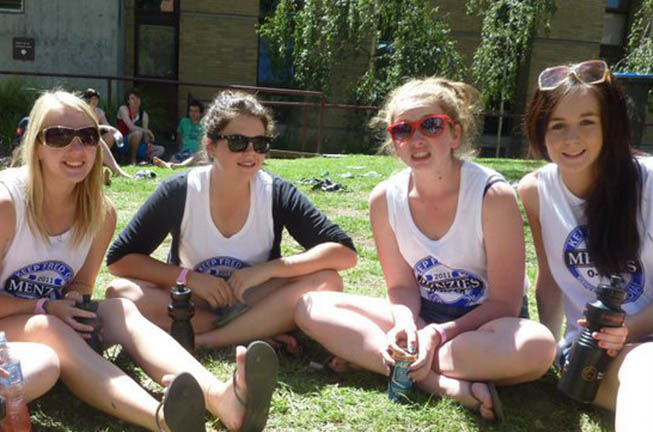
“I didn’t know exactly what I wanted to study after high school. During VCE, my priorities were always around netball and my networks, rather than academic study.”
Rebekah lodged her course preferences, throwing a mix of allied health courses in, including physiotherapy, health sciences and a course she’d never heard of before – Health Information Management.
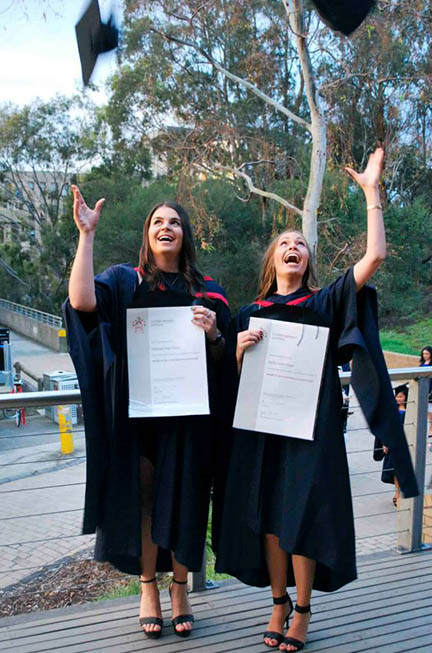
“Basically, Health Information Management was my ‘safe’ choice, since I honestly had no idea what it was,” she says.
Rebekah’s safe choice secured her a place at La Trobe and, much to her delight, a room at Menzies College.
“Menzies College was honestly one of the best experiences in my life,” she says. “I loved the people, and the fun, social lifestyle. It was a great opportunity to meet like-minded people and make long-life friends. Most residents were from regional areas at the same stage in life as I was. For the two years that I lived on campus, it really did feel like home.”
“On the other hand, Health Information Management, which all us students called ‘HIM’ for short, took a little while to understand. But once I did, I quickly learnt exactly where it could lead was as a career and I knew I was meant to be in this field.”
The close-knit group of HIM students provided Rebekah with that same sense of community she’d grown up with and the opportunity to use one of her favourite skills – networking.
Rebekah took her HIM skills overseas, too. She travelled to Nepal while studying with a group of friends from Menzies College. They spent three weeks volunteering with a Nepali school before completing a five day hiking trip in the Himalayas.
“We also got to do volunteer activity of choice, and I decided to utilise my HIM skills. I created a medical record system for a small medical clinic in Nepal, to help staff document patient information when they visited the clinic.”
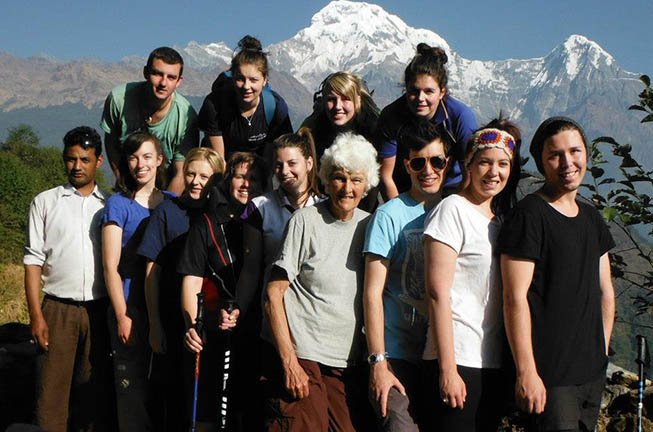
The bright lights of Chicago
Rebekah was no stranger to international travel. Every few years, she would join her family aboard a plane bound for Northern Illinois in the U.S. to visit her mother Michelle’s family. So, when she saw an eight-week placement block in the final year of her course plan, she knew exactly where she wanted to go.
“This was the point where I decided to take control of my own career and find my own placement organisation,” she says. “Usually the faculty will find them for you, but there can be limited options, so there was potential of receiving a placement that didn’t align with my interests.”
With the goal of moving to the U.S. in the future firmly seeded in Rebekah’s mind, she knew she wanted to use her eight weeks to get her foot in the door there.
“Luckily, I have an American passport, so I knew this was a very real possibility,” she says.
She reached out to the American Health Information Management Association (AHIMA).
“I received a response almost immediately. They were very excited to have someone from Australia who could legally complete a 4-week project at their company without sponsorship. Even better, AHIMA is based in Chicago where my mum is from. I booked flights and off I went.”
During her placement, AHIMA was in the process of creating a global workforce council. Representatives from countries including Brazil, Germany, Australia, India and the United Arab Emirates came together in Chicago to develop a Health Information Management curriculum to enhance HIM as a career in developing countries.
“This experience opened my eyes to an entirely new perspective of HIM and the international networking opportunities it offers. During this placement, I also fell in love with Chicago and knew I definitely wanted to come back.”
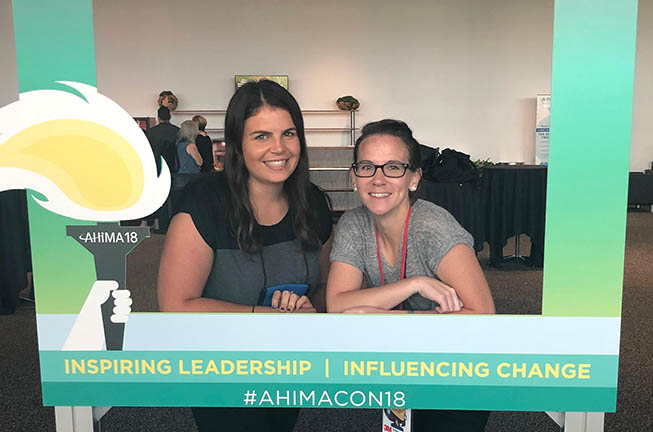
Upon returning to Australia, Rebekah’s final placement was at Bendigo Health, which helped her narrow down the specific pathway she wanted to pursue – one that was only just emerging at the time.
“It was during their vendor stage of the implementation of an Electronic Medical Record (EMR),” she says. “From this experience, I knew I didn’t want to follow the traditional HIM career pathway, but instead utilise the skillset to move into the future of healthcare, working with EMRs.”
An international career
While studying, Rebekah worked in the Health Information Department at the Royal Women’s Hospital, which gave her career a head-start before graduation. She knew from her placement experience that she didn’t want to work in a traditional HIM role, and instead decided to apply to work for EMR vendors including Epic and Cerner. She secured a full-time position with Cerner and was soon on her way to Kansas City, USA, for a month-long training program.
Specialising in surgery and anaesthesia, Rebekah worked on large-scale projects including the Queensland Health Statewide Cerner implementation, as well as projects with Austin Health and Alfred Health.
“I jumped straight into the deep end, talking through recommended workflows with directors and managers in these organisations. From this I learnt a lot very quickly, which basically set me up with the career and opportunities I wanted to pursue.”
Cerner also sent Rebekah to the UK to teach a class about configuring their Surgery and Anaesthesia System, bolstering her global experience in the health IT industry.
“After the two years at Cerner I thought it was time to make my dream come true and move to the U.S.,” she says.
Rebekah considered transferring to Cerner’s U.S. base in Kansas City, but she had her heart set on living in Chicago. She took a risk, quitting her job at Cerner to move to Chicago without a job.
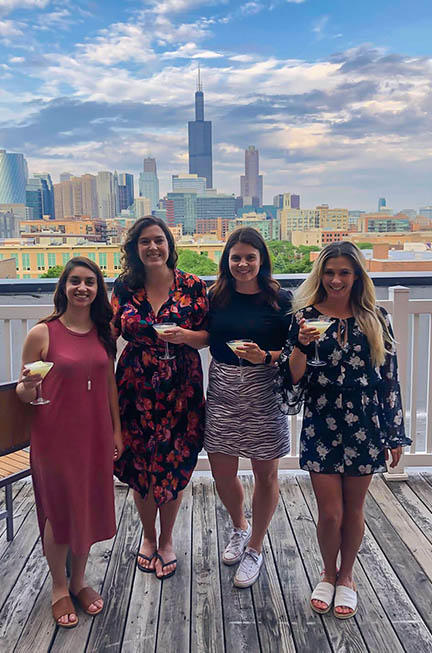
“I was very lucky in this situation as I was legally able to move to the USA without sponsorship and I could stay with my family until I found a job.”
Making the most of living in a new country (and hemisphere), Rebekah backpacked all over Canada and the U.S. until she was ready to put down roots in her new home. It wasn’t as easy as she’d hope to break into the U.S. workforce, as many of the hospitals in Chicago had changed over their systems and were now using Cerner’s rival, Epic. Rebekah knew it was time to capitalise on a resource she’d been building for years – her networks.
“It was difficult to get a job without prior Epic-specific experience,” she says. “So, I reached out to my old placement supervisor at AHIMA for industry contacts and right away she said, “good timing, we are creating a new position”, and that she thought I’d be prefect for it.”
Rebekah secured the role, working for one-and-a-half years as the Student Engagement Manager for AHIMA, managing all of the HIM student and new graduate programs and resources for the association.
“I was basically the lead mentor for all the HIM students/new graduates in the U.S. This was an amazing opportunity as I am very passionate about HIM and the future of healthcare.
“My biggest achievement within this role was organising a student program at AHIMA’s annual conference with a career fair, guest speakers and a volunteer program with 25 students who had the opportunity to attend the conference for free. I also worked very closely with many HIM facility heads around the U.S., which again was great networking.
“I loved this role, but I knew deep down I wanted to follow the Health IT pathway,” she says. “One day I went for a drink with a friend who brought along another friend who was also a HIM. They’d worked for Cerner in the past and now worked for a Chicago hospital that was just starting a project to replace Cerner with Epic.”
This casual networking opportunity led to a new role as an Application Analyst at the University of Illinois hospital where Rebekah was able to get ‘Epic Certified’, opening the door for future opportunities with the company.
“I knew this was a great opportunity to help me continue living in the U.S., but I also knew it would set me up to eventually move back to Australia, especially with the recent implementation of Epic at the Parkville Precinct.”
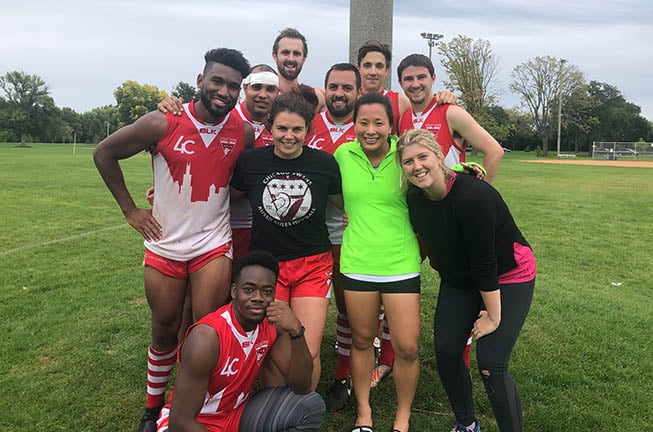
Rebekah made the most of her life in Chicago, living in an apartment in the thick of the action near Lake Michigan and Wrigley Field. She met other Aussie expats by joining the Chicago Swans AFL club. At the time, she was one of just two girls on the team – something she’d soon change.
“With AFLW growing very quickly in Australia at the time the club wanted to build a women’s team, so I lead this effort to recruit and train a team,” she says. “We got up to 10 girls on our team in a year, where we travelled with the boys to different cities in America to play, including cities in states like Wisconsin, Iowa, Colorado, Tennessee, Ohio and nationals in Florida.
“I had a lot of American friends, but I also appreciated my Australian network. We shared the same kind of friendships as those I had at Menzies – people in the same situation who were very like-minded.”
On the weekends, Rebekah travelled the U.S., hearing live country music in Nashville, exploring the desert in Arizona, skiing in Colorado, wandering the streets of New York, hiking in California and experiencing the southern charm of Alabama.

A sign pointing home
While Rebekah was living her ‘best life’ in Chicago in 2020, a mystery illness was quietly spreading on the other side of the world. Rebekah weathered the storm of COVID-19 and Chicago’s harsh winter from within the confines of her apartment building. Many of her friends had moved away, she hadn’t seen her family back at home in two years and the lockdown felt as though it would never end.
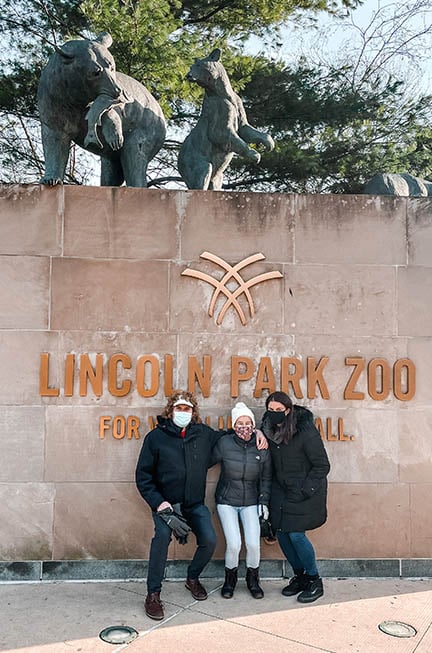
“It got to the point where I caught COVID, along with many others I knew,” she says. “Australia was closing its borders and I had to choose whether I would book a flight or wait it out.”
Rebekah recovered, and after four years in the U.S., she decided it was time to head home.
While browsing LinkedIn, she saw a role at the Royal Children’s Hospital that piqued her interest. It was the exact job she was currently doing in the U.S.
“It was a big deal because a Surgery/Anaesthesia Epic Analyst is very niche,” she says. “There are only around five roles in Australia. As soon as I saw that job, I saw it as a sign to make the move home.”
Not knowing whether or not the role would be hers, Rebekah packed up her life, ready to head home.
Everything fell into place. Though Australian border caps had been cut in half, and airfares had soared through the roof, by pure luck Rebekah managed to arrive safely in Australia (and hotel quarantine). She landed the job as and Optime/Anaesthesia Epic Analyst servicing The Royal Children’s Hospital, The Royal Women’s Hospital, The Royal Melbourne Hospital and Peter MacCallum Cancer Centre.
“My career is very rewarding,” says Rebekah. “Not only am I working to improve healthcare, I get to work very closely with surgeons, anesthetists and healthcare leaders on improving their care through electronic processes.
“I think it’s so awesome that the health IT industry is so interconnected globally that I could go anywhere with my skillset and find a job comfortably. I also loved the idea that when I did decide to move home that my experience in the U.S. was only going to enhance my opportunities rather then set me back.
“I can’t even imagine what my future has in store in this career as I have already experienced so much.”
Rebekah suggests students work on advancing their career while studying, by building their networks and mapping out their own individual goals.
“I’ve always prioritised investing my time and energy in building relationships with people. That’s what has gotten me to where I am today. The key is to be genuine, as others see right through people that aren’t. Yes, grades will help you stand out when you first starting off, especially in competitive fields, but that’s not the only way. Networking is key! Start talking to people, building those relationships, reaching out and asking for advice.
“My greatest advice, though is to think outside of the box in your industry, take control of your career and opportunities and don’t wait for other people to put them in front of you. Seek them out yourself.”

